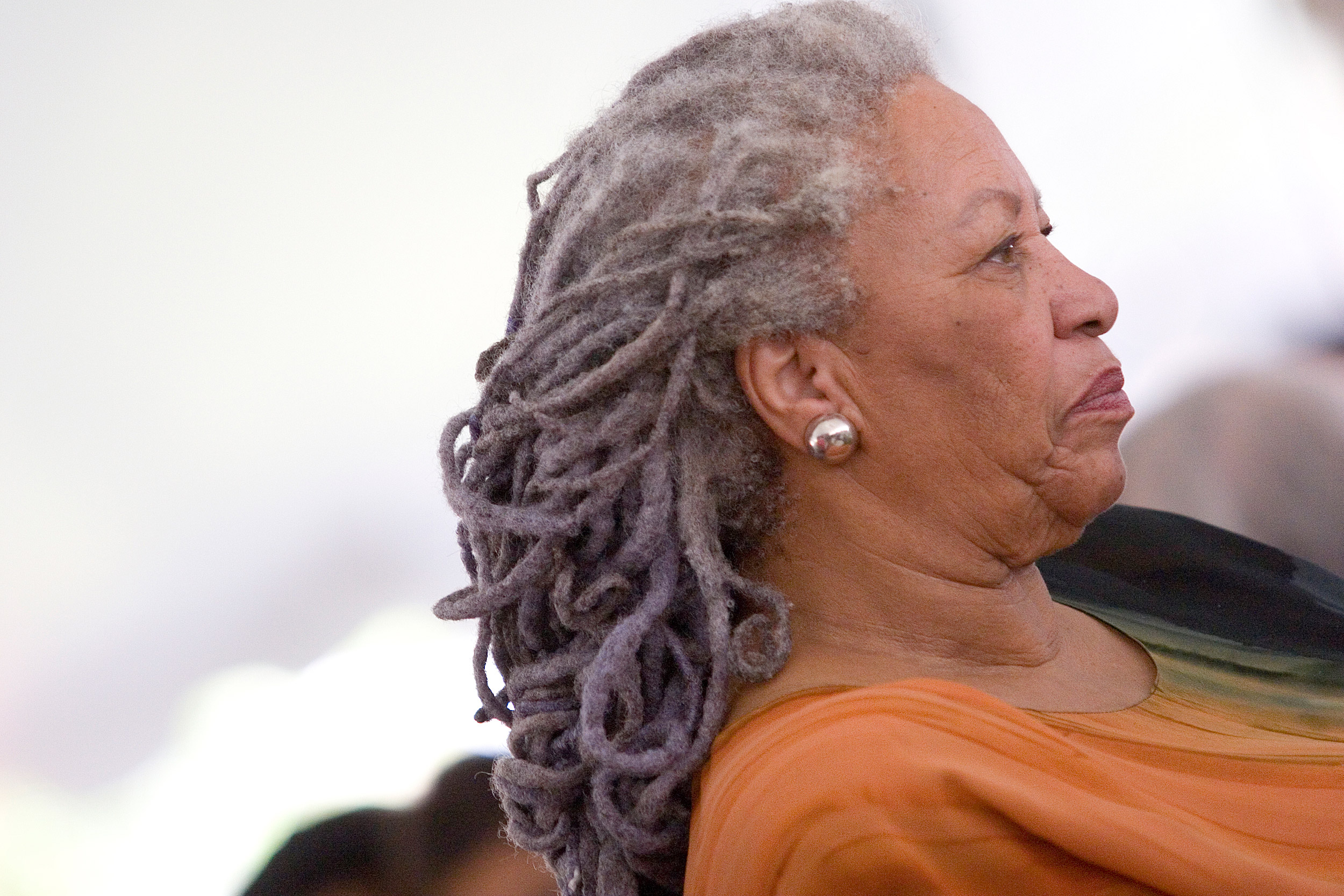
Stephanie Mitchell/Harvard News Office
From the borderline
Radcliffe medalist Morrison on the humanities
Under a big tent set for lunch in breezy Radcliffe Yard on Friday (June 8), Nobel Prize-winning novelist Toni Morrison offered a gathering of 950 graduates, fellows, and friends a brief meditation on the oblique efficacy of the humanities. She said these “creative, imaginative arts” counsel, goad, and interrogate American culture from its own borders.
The humanities still function “best, and most brilliantly, from the edge,” said Morrison.
The meditation was delivered in her trademark style. Measured and slow, each word was spoken as if it were wrestled into precision at that moment.
Morrison was awarded the Radcliffe Medal and delivered the keynote address at the luncheon on Radcliffe Day. It’s an annual celebration of Radcliffe College, which merged with Harvard in 1999, and was itself a kind of borderland in a world of gender-divided academics.
“Radcliffe has become a creative boundary,” said outgoing Radcliffe Dean Drew G. Faust, who on July 1 will become Harvard’s first female president. She both introduced Morrison and bade farewell to the Radcliffe Institute for Advanced Study, the Harvard-affiliated scholarly community that the college changed to in 2000.
“Radcliffe has always represented an experience of faith,” said Faust, calling on a phrase first used by Le Baron Russell Briggs, the college’s second president (1903-1925). It referred first to a faith in women’s intellect, and to Faust it refers now to a faith in the power of creativity.
One engine of that creativity is an annual class of fellows that Radcliffe hosts starting each fall. The resident artists, historians, writers, and scientists every year go on to earn Pulitzers, write best sellers, or win similar honors that are cataloged in a Fay House bookcase, “which is getting full,” said Faust.
For the 2007-08 class, 51 Radcliffe Fellows were selected from a pool of more than 775 applicants. Stiffer odds than being accepted at Harvard College.
Morrison delivered the fifth annual Radcliffe Lecture in 2001, and this year listened to praise, and stood for two standing ovations. “Book by book, Toni Morrison has confronted the national memory,” said Faust. “And word by word, she has cleansed it.”
The cleansing came from the power of Morrison’s beautifully written stories, said Faust, “filled with loss, haunting, beauty, cruelty, and catastrophe.”
Morrison, who twice won the Pulitzer Prize for fiction, took the praise with good humor, and a dose of salt. “I really adore my life as recorded and delivered by Drew,” she said, since it leaves out all the “doubts and regrets and mistakes” there were along the way. “It just flows along in an organized fashion.”
If there was an organizing principle to Morrison’s life, she said, it was learning to read at age 3, and falling under the spell of the written word. Reading marked her path from high school graduation in Lorain, Ohio (1949), when opportunities were not plentiful for “an African-American female without money, who was simply fairly well-read,” Morrison said. “So I just followed the books.”
She followed the books to college (Howard University), graduate school (Cornell University), to teaching (Howard and elsewhere), and then to publishing. (Morrison was an editor at Random House until 1989.)
“And there, in publishing,” said Morrison, now the author of eight major works, “I finally followed the books to writing them.” By 1989, critical acclaim propelled her into a teaching career at Princeton University, which she gave up just last year.
Along that book-lined path, early in the 1950s, “the most critical, the most engaged, the sort of edgy ideas were only to be found in the humanities,” said Morrison. She described a McCarthy-era world in which the sciences dominated government resources, while the humanities “lay dormant in the academy.”
In those days, said Morrison, “humanistic studies made me aware of the dynamism that was raging at the border.”
That cultural border country — “a place the rich have to police,” she said — had already been marked out in American letters. Harriet Beecher Stowe and Mark Twain rejected their own culture, and wrote books about outsiders. Henry James and others, in protest, embraced other cultures — and wrote about outsiders. And still other celebrated American writers (Melville, Hurston, Faulkner, Hemingway) interrogated culture from within — given the humanities’ “ruthless gaze on the center,” said Morrison. And these writers wrote about outsiders.
A fiction writer “is an outsider within,” said Morrison, whose fiction compounds that ruthless gaze with added layers from an American context of slavery, poverty, sexual abuse, and violence.
Fiction writing, and the freedom of movement and thought it offered up, she said, “became a way for me to be at home in this world.”




